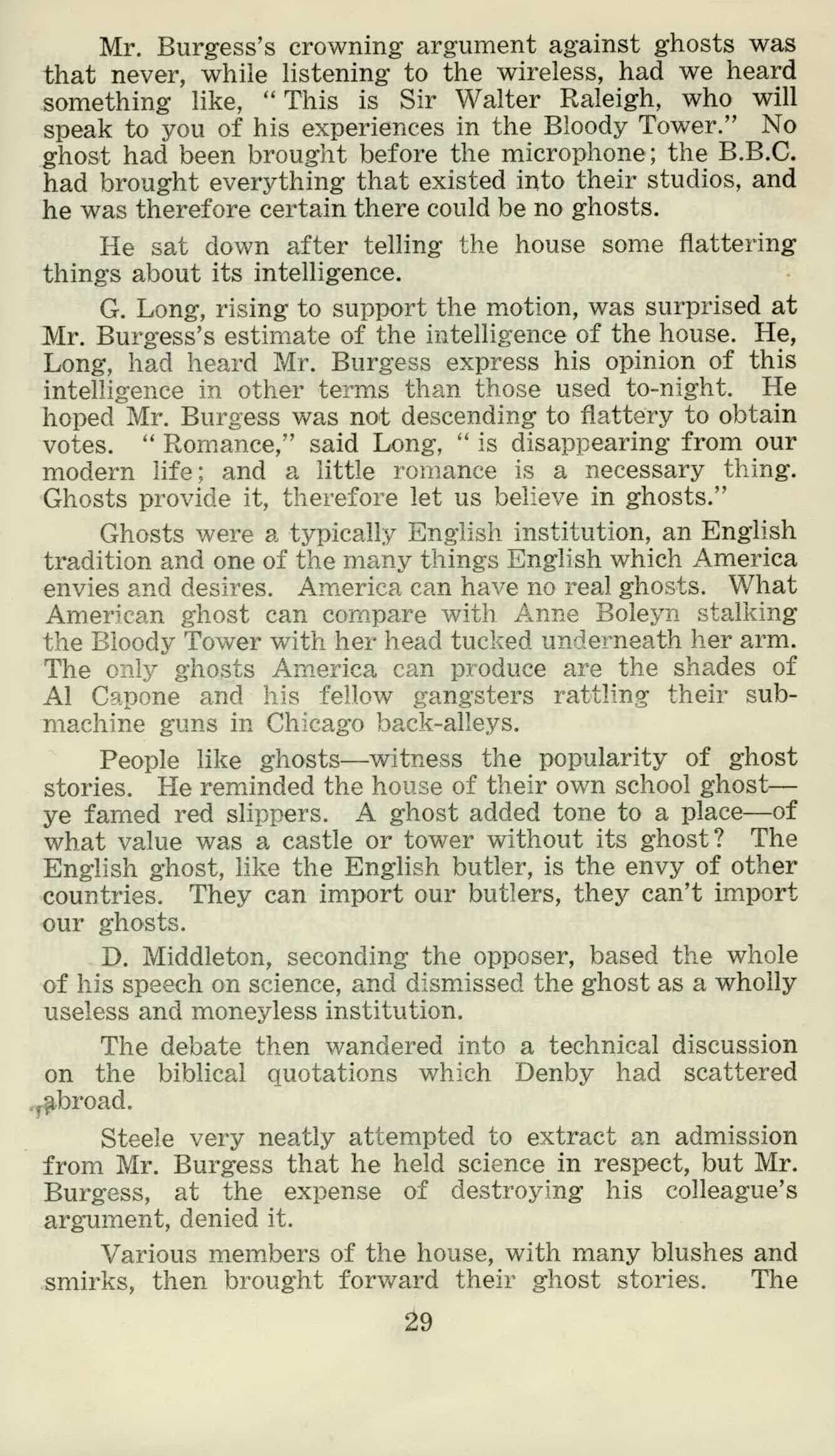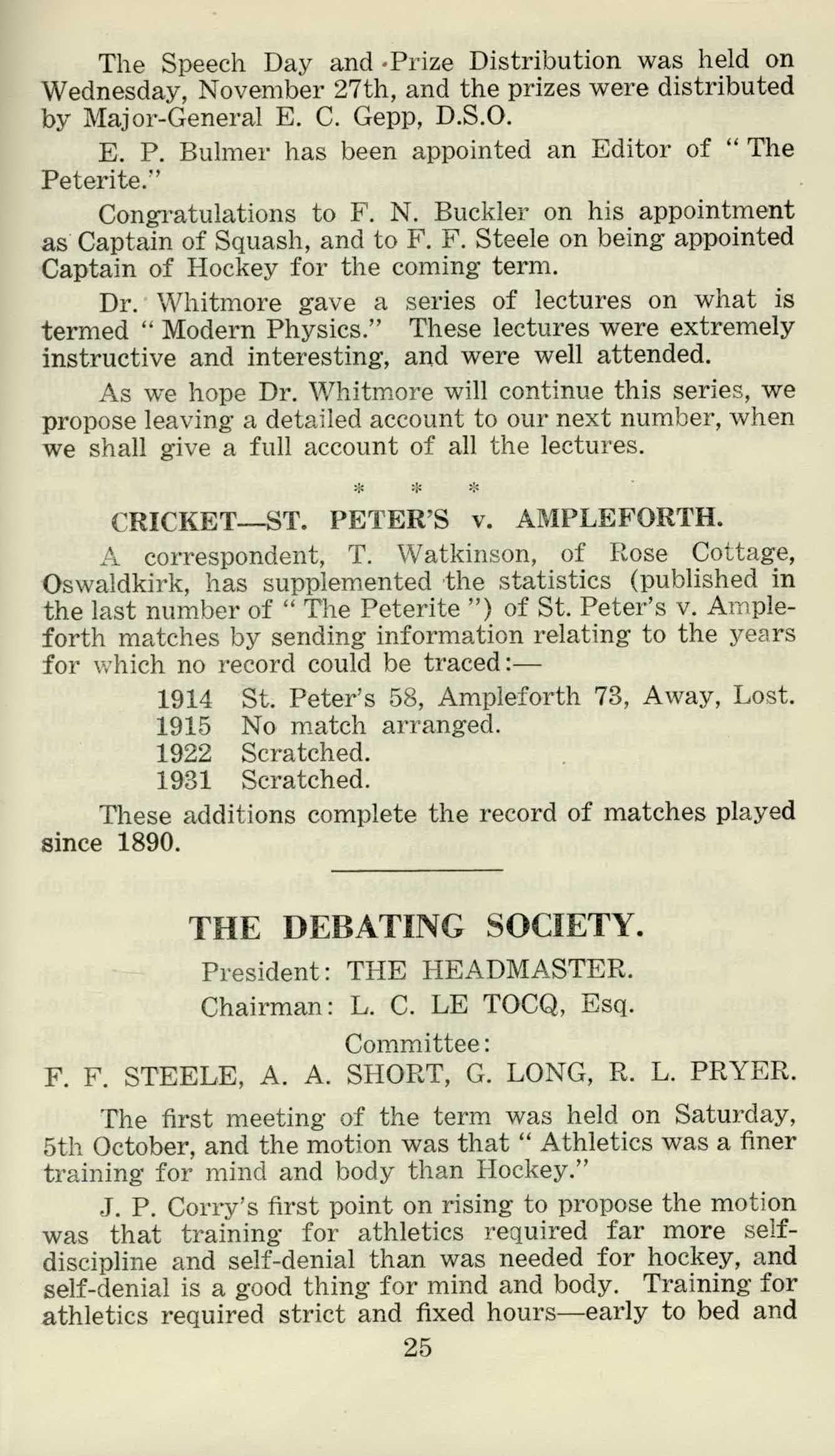
9 minute read
The Debating Society
from Jan 1941
by StPetersYork
The Speech Day and .Prize Distribution was held on Wednesday, November 27th, and the prizes were distributed by Major-General E. C. Gepp, D.S.O.
E. P. Bulmer has been appointed an Editor of " The Peterite."
Congratulations to F. N. Buckler on his appointment as Captain of Squash, and to F. F. Steele on being appointed Captain of Hockey for the coming term.
Dr.. Whitmore gave a series of lectures on what is termed " Modern Physics." These lectures were extremely instructive and interesting, and were well attended.
As we hope Dr. Whitmore will continue this series, we propose leaving a detailed account to our next number, when we shall give a full account of all the lectures.
CRICKET—ST. PETER'S v. AMPLEFORTH.
A correspondent, T. Watkinson, of Rose Cottage, Oswaldkirk, has supplemented the statistics (published in the last number of " The Peterite ") of St. Peter's v. Ampleforth matches by sending information relating to the years for which no record could be traced:- 1914 St. Peter's 58, Ampleforth 73, Away, Lost. 1915 No match arranged. 1922 Scratched. 1931 Scratched.
These additions complete the record of matches played since 1890.
President : THE HEADMASTER. Chairman : L. C. LE TOCQ, Esq. Committee : F. F. STEELE, A. A. SHORT, G. LONG, R. L. PRYER.
The first meeting of the term was held on Saturday, 5th October, and the motion was that " Athletics was a finer training for mind and body than Hockey."
J. P. Corry's first point on rising to propose the motion was that training for athletics required far more selfdiscipline and self-denial than was needed for hockey, and self-denial is a good thing for mind and body. Training for athletics required strict and fixed hours—early to bed and 25
early to rise made a man healthy and all the rest of it. After a short speech he sat down.
F. F. Steele was then called upon by the Chairman to oppose the motion. Steele argued that athletics was a selfish sport. Though admittedly stricter training was required, the training is carried out for self, and whenever a person began thinking about himself only, that person's mind became warped, and thus athletics was bad for the mind. That it was good for the body, Steele did not doubt, but he contended that the resultant distortion of the mind more than counterbalanced the increase in physical fitness. Unless a person was a born athlete, athletics was not an enjoyable sport. Hockey, however, could be enjoyed by anyone, be he a good or bad player.
H. D. Revill, in seconding the motion, said that in this time of war he considered a knowledge of how to run essential (laughter) . He then touched on the serious accidents which occurred in hockey, and said he knew of few things he would less like to face than a team of female hockey players. His next point was that as running was the basis of hockey, if the School learnt to run, the standard of hockey would improve.
D. Cole, seconding the opposer, said that far from athletics improving the standard of hockey it had greatly lowered it. The hockey team, which got into its stride about half-term, then had to stop and give way to athletics. A few years ago this School had a reputation for first-class hockey, not merely in England, but in Europe. But this reputation, like our reputation for squash, was dying.
Cole stressed the importance of the team spirit which hockey cultivated.
The debate was then thrown open to the house.
Long rose, and traced hockey back to " Shinty," an Irish game, and to a game played in Central Africa by natives using tree-trunks and skulls. Hockey, according to Long, pandered to the viciousness in man in that it encouraged them to maltreat a harmless ball.
Denby was up in arms against athletics, talking with great volubility and fluency for five minutes. He then said he didn't know what he was talking about, and sat down to allow an astounded house to recover.
After some more speeches from the house, Steele summed up for the opposition. Corry replied in favour of the motion.
After a vote, the motion was defeated by 23 votes to 10. 26
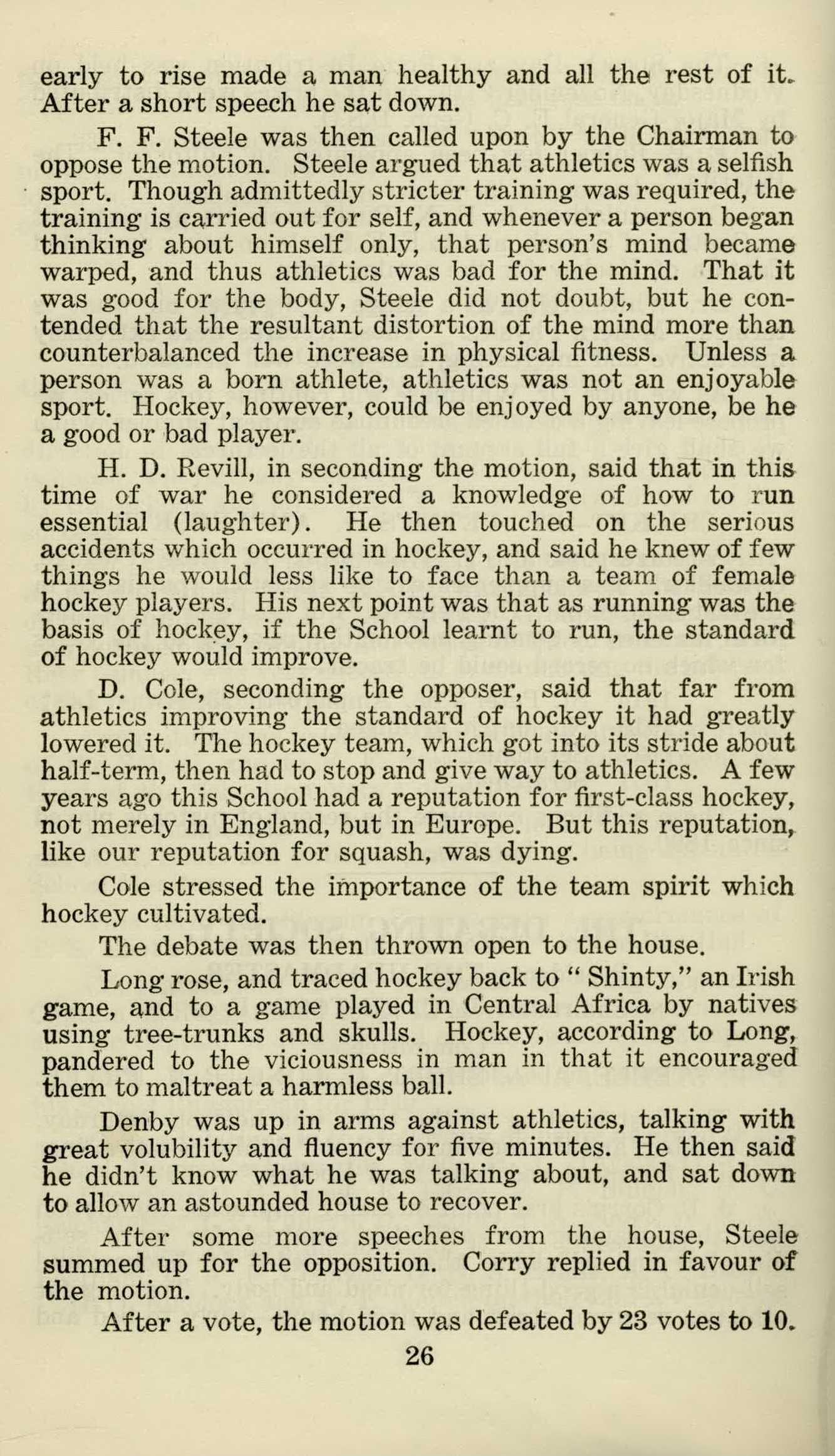
The next meeting was held on Saturday, 19th October.
The Chairman called upon G. W. Vero to propose the motion that " This House would approve the policy of purely reprisal raids over Germany."
Vero's first point was that bombing towns in Germany would increase the morale of the British people in the towns which had been so severely bombed. These persons would be able to stand up to this bombing very much better if they knew that German women and children were receiving it too.
The damage we did to military objectives was easily ringed off, and thus the German people did not realise how powerful and accurate our bombing was. To show them this, we must bomb towns and villages. This would smash Goering's boast that no R.A.F. plane would fly over Germany.
T. B. Boulton, in opposing the motion, did not think it fair that we should add to the suffering of the German women and children. " How," asked Boulton, " could we construct a world of friendship between nations with a German nation remembering the suffering caused by our inhuman attacks ? "
He then argued that to bomb women and children was a waste of bombs, petrol and planes, because those bombs and the journeys across Germany, instead of maiming a few thousand civilians, could blow up ammunition dumps, factories, etc.
Boulton concluded by an appeal to the chivalry of the British nation, whose tradition it was to obey the rules of war.
J. A. Denison, in supporting the seconder, made a concise and clear speech, his points being:— (1) Deep shelters are impossible in Berlin because of the numerous lakes surrounding the town. (2) The effect on the morale of our people caused by the bombing of German towns. (3) The Germans were not so prepared as we were for air attacks, as we had had some experience of them in the last war, whereas Germany had not.
R. Pryer, in seconding Boulton, stated that railway sidings should be specially attacked, thus causing an increase in the food shortage. He also stated that our bomber force was so small that we needed every plane available for bombing to smash German invasion bases.
27
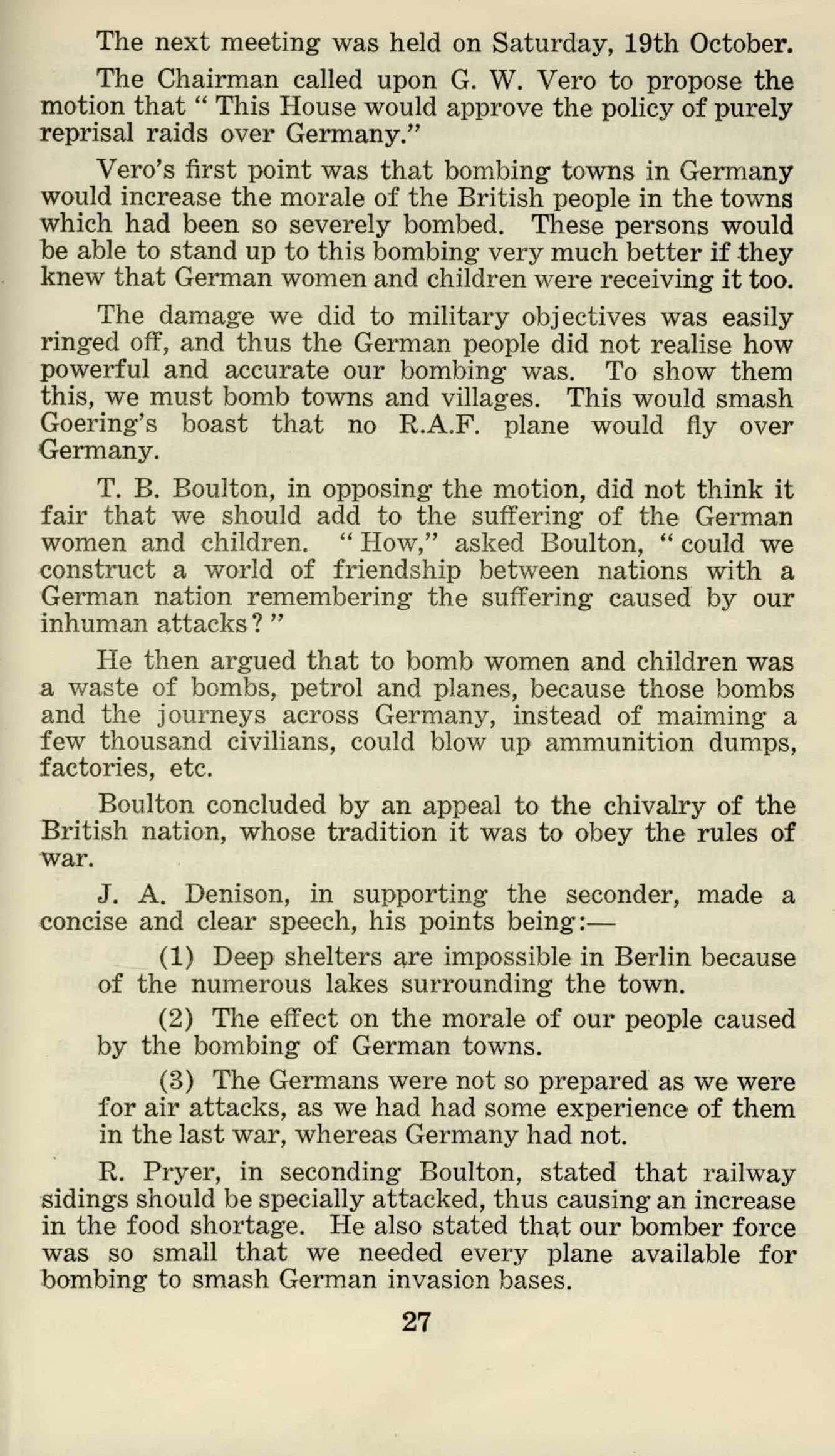
Dr. Whitmore agreed that our bomber force was too small to waste on children, but H. Brown was for bombing the children and getting them out of the way (reason unknown but presumably because they will fight in the next war), and then bombing the women, thus causing a shortage in labour.
Several speakers spoke somewhat irrelevantly and at great length from the house before Boulton was called on to sum up against the motion. Boulton ridiculed some of the sillier speeches, and reiterated his points.
Vero, in summing up, said that we had a very large bombing force, and that indiscriminate bombing would ruin the morale of the German people. We don't know where he got these ideas from, but he seemed very sure of them.
A vote was taken, and we have to record that the motion was carried by 19 votes to 11.
The last meeting of the term was held on Saturday, 16th November. •
After the minutes had been read, the Chairman called on G. W. Denby to propose the motion that " This House believes in Ghosts."
Denby rose and urged us to rid ourselves of the idea that ghosts were condemned souls who walked about clanking chains. He then produced his theory, viz., there is no proof that there are no ghosts, therefore, there are ghosts.
He then told us some soul-shaking ghost stories, but just when he got to the point, would break off and announce to the house with complete conviction that this therefore proved the existence of ghosts. Spiritualism and mediums were brought before a sceptic house as examples of the better class of ghost. He then sat down, leaving it to the good sense of the house to deduce the correct answer from the mass of evidence he had placed before them.
Mr. Burgess rose to oppose the motion. He made a very clever and amusing speech, exposed Denby's fallacies and himself made a number of remarkable statements. For instance, he stated that Shakespeare was a quack charlatk_i, who deliberately bolstered up ghosts to obtain a facile dramatic effect. Many members of the house welcomed this attitude to Shakespeare. It appeared that even Shakespeare, whom we were taught to regard as a god, had feet of clay. He wrote, in common with all writers from the beginning of civilisation to the end, for money. 28
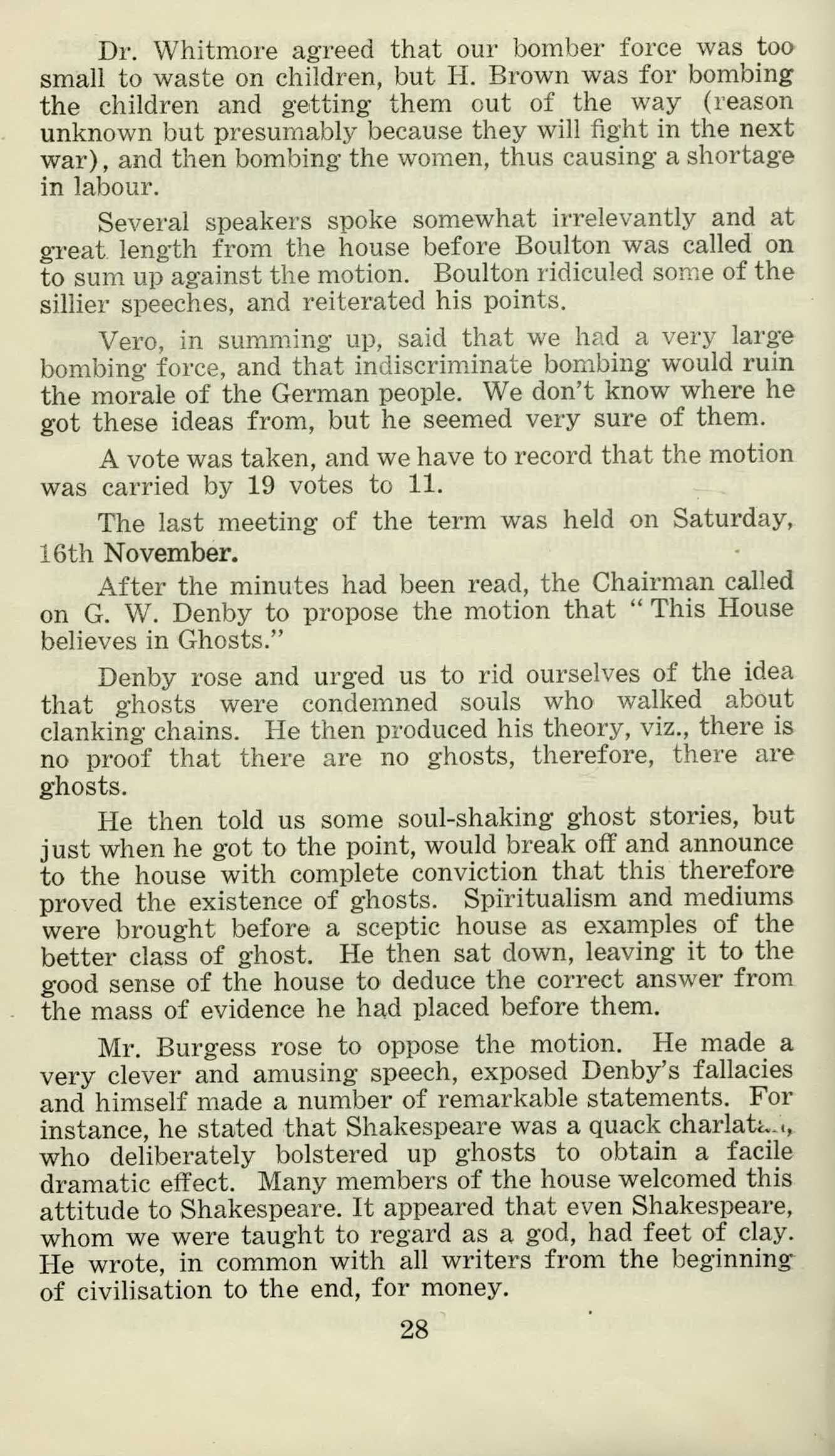
Mr. Burgess's crowning argument against ghosts was that never, while listening to the wireless, had we heard something like, " This is Sir Walter Raleigh, who will speak to you of his experiences in the Bloody Tower." No ghost had been brought before the microphone; the B.B.C. had brought everything that existed into their studios, and he was therefore certain there could be no ghosts.
He sat down after telling the house some flattering things about its intelligence.
G. Long, rising to support the motion, was surprised at Mr. Burgess's estimate of the intelligence of the house. He, Long, had heard Mr. Burgess express his opinion of this intelligence in other terms than those used to-night. He hoped Mr. Burgess was not descending to flattery to obtain votes. " Romance," said Long, " is disappearing from our modern life ; and a little romance is a necessary thing. Ghosts provide it, therefore let us believe in ghosts."
Ghosts were a typically English institution, an English tradition and one of the many things English which America envies and desires. America can have no real ghosts. What American ghost can compare with. Anne Boleyn stalking the Bloody Tower with her head tucked underneath her arm. The only ghosts America can produce are the shades of Al Capone and his fellow gangsters rattling their submachine guns in Chicago back-alleys.
People like ghosts—witness the popularity of ghost stories. He reminded the house of their own school ghost— ye famed red slippers. A ghost added tone to a place—of what value was a castle or tower without its ghost ? The English ghost, like the English butler, is the envy of other countries. They can import our butlers, they can't import our ghosts.
D. Middleton, seconding the opposer, based the whole of his speech on science, and dismissed the ghost as a wholly useless and moneyless institution.
The debate then wandered into a technical discussion on the biblical quotations which Denby had scattered ,T#broad.
Steele very neatly attempted to extract an admission from Mr. Burgess that he held science in respect, but Mr. Burgess, at the expense of destroying his colleague's argument, denied it.
Various members of the house, with many blushes and smirks, then brought forward their ghost stories. The 29
